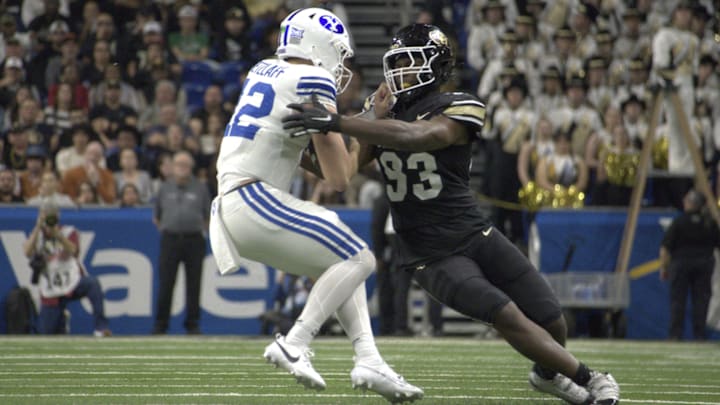No. 23 Colorado falls to No. 17 BYU 36-14 in Alamo Bowl

The No. 23 Colorado Buffaloes fell to the No. 17 BYU Cougars 36-14 in the Alamo Bowl on Saturday night, closing out their season with disappointment after a year marked by remarkable progress. BYU’s fast start left Colorado chasing the game from the outset, as the Cougars surged to a 20-0 halftime lead that proved insurmountable.
Jake Retzlaff, BYU’s quarterback, didn’t post eye-popping numbers, completing just 12-of-21 passes for 151 yards and throwing two interceptions. However, the Cougars' ground game, spearheaded by LJ Martin, proved to be the difference. Martin rushed 16 times for 88 yards and found the end zone twice, helping to sustain drives and control the clock.
Colorado’s offense, on the other hand, struggled to find its rhythm. Quarterback Shedeur Sanders had an uncharacteristically quiet first half, going 7-of-10 for only 70 yards. The running game, while efficient on a per-carry basis, failed to translate into extended drives. Isaiah Augustave and Micah Welch offered respectable averages, but the Buffs could not overcome the offensive stagnation.
Travis Hunter, the Heisman Trophy winner and Colorado’s most dynamic playmaker, made the most of his limited opportunities, recording two receptions for 60 yards in the first half, including one catch for 30 yards. Despite his impact, the Buffs lacked consistency moving the chains. Wide receiver Jimmy Horn Jr., whose return from injury was highly anticipated by Coach Prime and Sanders, caught two passes but managed just three yards.
Defensively, Colorado showed flashes of potential. Taje McCoy and Chidozie Nwankwo registered sacks, while DJ McKinney and Anquin Barnes Jr. came up with interceptions. Shilo Sanders narrowly missed adding a third interception to the Buffs’ tally, but his play was negated by a penalty before the snap. Despite these efforts, BYU’s ability to capitalize on scoring opportunities and avoid critical mistakes kept Colorado at bay.
By halftime, the Cougars outgained the Buffs 157-72 in total yardage. Colorado’s inability to generate meaningful offensive production compounded their struggles, making a comeback seem improbable. Coach Prime had cautioned all week that BYU was a disciplined team that wouldn’t beat itself, and his prediction rang true as the Cougars maintained composure and control throughout.
In the second half, Sanders found a bit more success, finishing the game 16-of-23 for 208 yards with two touchdowns and two interceptions. However, the bulk of that production came late, once the game was already out of reach. Hunter once again shone brightly, hauling in four receptions for 106 yards and a touchdown, but his heroics weren’t enough to bridge the deficit.
The Buffaloes’ final stat line told the story of their struggles. Colorado managed just nine first downs and two total rushing yards – both marks setting new records for the fewest in Alamo Bowl history. The offensive line’s inability to protect Sanders was evident, as they surrendered four sacks, including one that resulted in a loss of 20 yards.
BYU’s victory capped off one of their best seasons in recent memory, improving to 11-2 and providing momentum heading into next year. For Colorado, the 9-4 finish was bittersweet. While the Buffs experienced a dramatic turnaround from previous seasons, the Alamo Bowl loss underscored lingering gaps that must be addressed.
As Colorado looks to the future, they face the challenge of replacing key players, including projected top-five NFL Draft picks Hunter and Sanders. The Buffs’ rise under Coach Prime has been undeniable, but sustaining that success will require retooling and reloading the roster. The Alamo Bowl may have ended in disappointment, but the foundation for future growth remains firmly in place.
